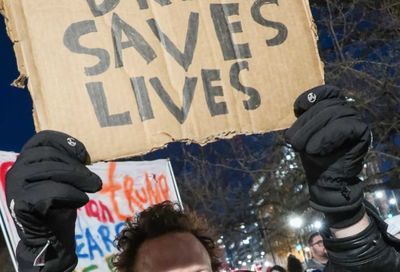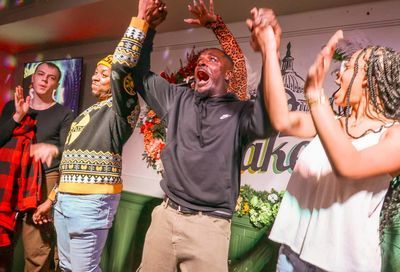Marshall’s Parting Shots
Virginia lawmaker tries to sneak two anti-gay amendments into the state budget
If the last week proved anything to Virginia’s LGBT community, it’s that one always needs to keep an eye on the machinations of the commonwealth’s General Assembly, particularly the House of Delegates.

Earlier in this year’s session, advocates for the LGBT community had introduced more than 20 bills seeking to expand LGBT rights by prohibiting employment discrimination, housing discrimination and clarifying that the commonwealth’s marriage and adoption laws now apply to same-sex couples. Only two of those bills passed out of committee and received a floor vote, both of them in the Senate, where they narrowly passed. Every bill, including the two passed by the upper chamber, was killed in the House of Delegates at the committee or subcommittee level. With all bills effectively killed for the remainder of the session, many figured that pro-equality forces would resign themselves to this year’s defeats and redouble their efforts during next year’s legislative session.
Enter Del. Bob Marshall (R-Manassas, Manassas Park, Sudley, Bull Run), who saw two anti-gay bills he had introduced killed by House subcommittees dominated by his fellow Republicans on Jan. 29. Those two bills would have allowed any individual or business that is licensed or certified by the state to discriminate against same-sex couples or LGBT individuals by citing religious or moral opposition to homosexuality, and would have allowed agencies that contract with Virginia state government to discriminate against LGBT people. But despite those defeats, Marshall proved he was not done trying to strongarm his socially conservative agenda into the Virginia budget.
While much of the press has fixated on anti-abortion amendments introduced by Marshall that were approved as part of the House’s version of the budget bill, Marshall introduced two other amendments last Thursday that sought to curtail LGBT rights. The first would have prohibited the use of any government funds to “be used to implement any executive order, directive, guidance opinion, or other executive instrumentality that purports to add to the protected classes of persons not otherwise already enumerated in the Virginia Human Rights Act.” In practice, that means that an executive action, like Executive Order One, which prohibits LGBT employment discrimination by state agencies, and was issued by Gov. Terry McAuliffe (D) on his first day in office, could not be enforced. Similarly, an opinion by the state’s attorney general pertaining to the treatment of same-sex couples by state agencies, as in matters of adoption or foster care placement, for example, would also be hamstrung by that provision. Under Marshall’s amendment, only the General Assembly would be empowered to make such a change to expand the protections of the Human Rights Act to cover sexual orientation or gender identity.
The second amendment introduced by Marshall would have prohibited the use of government funds to implement any executive orders or guidance that would seek to substitute any gender-neutral terms such as “spouse” into the Code of Virginia in place of gender-specific terms like “husband” and “wife.” As with his first amendment, only the General Assembly would be tasked with changing those outdated gender-specific terms relating to statutes pertaining to issues such as marriage, adoption, or inheritance rights, to name a few. Two bills introduced by Sen. Adam Ebbin (D-Alexandria, Arlington, Belle Haven) and Del. Marcus Simon (D-Falls Church, Merrifield, Pimmit Hills) sought to make those changes, but both were defeated in a House subcommittee. A third bill by Del. Rip Sullivan (D-McLean, Arlington) sought to commission a study of what might happen if the General Assembly were to implement such changes without taking any definite action, but that bill was also killed by a Republican-dominated House subcommittee.
In the end, neither of Marshall’s amendments made it into the final version of the House budget bill, but many political observers were seemingly caught off guard by the move. In fact, due to a confusion regarding the numbering of Marshall’s multiple amendments, it seemed, for a short period of time, that Marshall’s amendment to restrict the executive branch from exercising its power to expand LGBT rights or protections had passed, rather than a Marshall amendment restricting the use of funds for abortion services.

Del. Scott Surovell (D-Mount Vernon, Fort Hunt, Hybla Valley), who has announced his intention to run for the seat of retiring Sen. Linda “Toddy” Puller (D-Mount Vernon, Woodbridge, Quantico) later this November, introduced his own amendment to the budget seeking to cement into law the protections granted by McAuliffe in his executive order to LGBT state employees. But a majority of House members voted to “pass by” Surovell’s amendment without actually debating its merits. The vote to pass by the amendment passed 63-36, with 30 of 32 Democrats, the chamber’s sole independent delegate, and 5 Republicans voting on the pro-LGBT side. A similar amendment introduced by Surovell last year saw 31 of 32 Democrats and 6 Republicans vote against “passing by” the amendment.
The five Republicans voting on the pro-LGBT side for both years were Delegates Dave Albo (R-Springfield, West Springfield, Lorton); Peter Farrell (R-Henrico, Louisa, Livingston); James LeMunyon (R-Oak Hill, Chantilly); Tom Rust (R-Herndon, Sterling); and Ron Villanueva (R-Virginia Beach, Chesapeake). Johnny Joannou (D-Portsmouth, Norfolk) was the sole Democrat to vote against the amendment both years.
Switching their position from last year and voting against the amendment were Delegates Roxann Robinson (R-Chesterfield, Dale) and Lionel Spruill (D-Chesapeake, Suffolk). But Spruill’s defection was offset by the support of newly-elected Del. Kathleen Murphy (D-McLean, Great Falls, Wolf Trap), who won a special election in January to replace the anti-gay Barbara Comstock, now a freshman member of the U.S. House of Representatives.
A spokeswoman for Equality Virginia, the commonwealth’s top LGBT rights organization, told Metro Weekly that the vote on whether to hear or pass by the amendment would be scored as part of Equality Virginia Advocates’ annual scorecard, meaning it will likely be taken into account when Equality Virginia’s political action committee decides to make endorsements ahead of this year’s elections, in which all 40 senators and 100 delegates will be up for re-election. However, unless this year’s primary and general elections result in a substantially different cast of characters, it is likely that Virginia’s elected officials will continue to be hostile toward their fellow LGBT Virginians. Therefore, it is more likely that future General Assembly sessions will see the introduction of other bills or budget amendments similar to those championed by Marshall, highlighting the importance of heightened and constant vigilance on the part of Virginians who support LGBT equality.
Support Metro Weekly’s Journalism
These are challenging times for news organizations. And yet it’s crucial we stay active and provide vital resources and information to both our local readers and the world. So won’t you please take a moment and consider supporting Metro Weekly with a membership? For as little as $5 a month, you can help ensure Metro Weekly magazine and MetroWeekly.com remain free, viable resources as we provide the best, most diverse, culturally-resonant LGBTQ coverage in both the D.C. region and around the world. Memberships come with exclusive perks and discounts, your own personal digital delivery of each week’s magazine (and an archive), access to our Member's Lounge when it launches this fall, and exclusive members-only items like Metro Weekly Membership Mugs and Tote Bags! Check out all our membership levels here and please join us today!
























You must be logged in to post a comment.